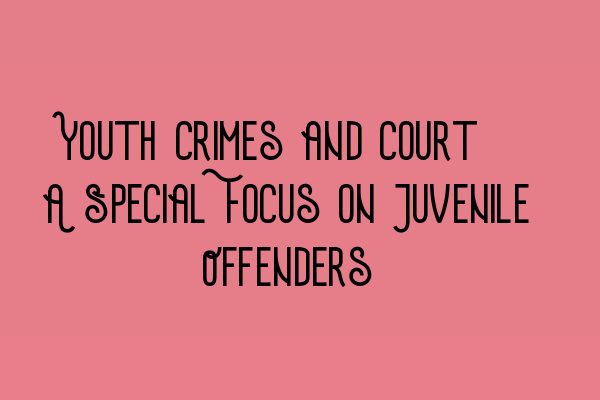Youth Crimes and Court: A Special Focus on Juvenile Offenders
At SQE Criminal Law & Practice Law UK, we understand the importance of addressing youth crimes and their impact on society. In this blog post, we will delve deeper into the topic, with a special focus on juvenile offenders. It is vital to analyze and address the root causes of youth crimes in order to find effective solutions to prevent future offenses.
The Importance of Understanding Juvenile Offenders
Juvenile offenders refer to individuals who commit crimes while they are under the age of 18. These young individuals often face unique circumstances and challenges that can influence their involvement in criminal activities. Understanding these factors is crucial to develop appropriate strategies for prevention, intervention, and rehabilitation.
Research has shown that juvenile offenders are more likely to come from disadvantaged backgrounds, with limited access to essential resources such as education, mental health support, and stable family environments. These factors contribute to a higher risk of delinquency and criminal behavior. By focusing on addressing these underlying issues, we can work towards breaking the cycle of crime and providing better opportunities for young individuals to thrive.
The Role of the Juvenile Justice System
The juvenile justice system plays a pivotal role in addressing youth crimes and ensuring fair treatment for juvenile offenders. This specialized system aims to balance the need for accountability and rehabilitation, recognizing the potential for young individuals to reform and reintegrate into society.
One of the key principles of the juvenile justice system is to focus on individualized treatment plans tailored to the specific needs of each offender. Rehabilitation and education programs are offered to support their personal growth, with the aim of preventing future criminal behavior. The ultimate goal is to steer them away from the path of crime and help them become productive members of society.
It is important to note that the juvenile justice system differs from the adult criminal justice system. The focus is on rehabilitation rather than punishment, recognizing that young individuals have a greater capacity for change. However, for more serious offenses, there may still be instances where a juvenile offender is treated as an adult and faces criminal charges in adult court.
Preventing Youth Crimes and Supporting Juvenile Offenders
Prevention is key when it comes to tackling youth crimes. It requires a holistic approach that encompasses the involvement of various stakeholders, including schools, families, communities, and government agencies. By addressing risk factors such as poverty, substance abuse, and educational disparities, we can create a safer and more equitable society.
Intervention and support for juvenile offenders are equally important. Rehabilitation programs should focus on providing them with the necessary skills, resources, and opportunities to reenter society successfully. This includes access to education, vocational training, mental health services, and mentorship programs. By addressing the underlying causes of their involvement in crime, we can empower them to make positive choices and lead fulfilling lives.
Conclusion
As professionals committed to criminal law and practice in the UK, it is our duty to shine a spotlight on youth crimes and court proceedings involving juvenile offenders. By understanding the complex issues they face, we can work towards a justice system that prioritizes rehabilitation and promotes the well-being of young individuals.
For more information about SQE Criminal Law & Practice Law UK, please feel free to explore our related articles:
- SQE 1 Practice Exam Questions
- SQE 1 Practice Mocks FLK1 FLK2
- SQE 2 Preparation Courses
- SQE 1 Preparation Courses
- SRA SQE Exam Dates
